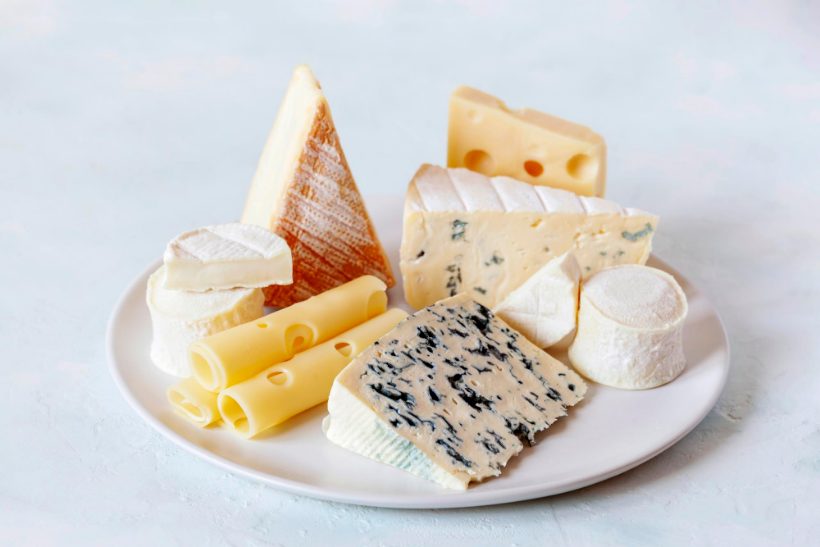No matter what type of cheese you eat, you are doing your body good. Health benefits of cheese does not get enough credit. Preventing cancer, strengthening bones, and fighting cavities are a handful benefits.
Nutritional facts
The concentration of essential nutrients in cheese is high. This includes high quality proteins and calcium. Cheese also contains phosphorus, zinc, vitamin a, riboflavin, and vitamin B12. It is rich in the amino acid tryptophan, which helps the body produce serotonin and melatonin. The tryptophan in cheese can help you sleep better at night or reduce your anxiety during the day. Cheese is also a great source of vitamin K2-MK7. K2-MK7 prevents osteoporosis by keeping calcium where it belongs-in your bones.
Nutritional facts about Cheddar, American Cheese and Mozzarella – 1 slice (1oz) (28g)
- Cheddar
- Calories – 113 Saturated fat – 6g Calcium – 202mg
- American Cheese
- Calories – 104 Saturated fat – 5g Calcium – 293 mg.
- Mozzarella
- Calories – 78 Saturated fat – 3g Calcium – 205 mg.
- Blue cheese (1 tbsp)
- Calories – 30 Saturated fat – 1.6g Sodium – 115.6 mg Protein – 1.8g
- Goat cheese
- Calories – 20 Saturated fat – 1.0g Sodium – 27.5 mg Protein – 1.3g
Health Benefits and Risks of Cheese
Dental Benefits of Cheese
Cheese is high in its calcium content, which is one of the most important benefits when it comes to strong teeth. Besides, cheese has a very low content of Lactose. Lactose derives from different foods and can harm teeth. The older the cheese, the lower the lactose levels. Eating cheese immediately after a meal prevents tooth decay. This includes cheddar, swiss, blue, monterey jack, and brie.
Key points
Cheese is high in calcium, good for teeth. Older cheese has less lactose. Enjoy cheddar, Swiss, blue, Monterey Jack, or Brie.
Cancer prevention
Cheese contains substances called Conjugated Linoleic Acid and Sphingolipids that are among the many benefits of cheese when it comes to cancer prevention. Vitamin B in cheese is good for maintaining body functions. It also protects the body from diseases. Research studies in the UK have not found any evidence to support the claim that dairy products and milk can cause cancer. NHS recommends adding dairy products to your diet. Dairy may even reduce the risk of bowel cancer according to the NHS Eatwell Guide.
Key points
Cheese contains nutrients like Vitamin B. Some studies suggest potential benefits in cancer prevention. NHS recommends dairy as part of a balanced diet.
Cheese Benefits for Weight Gain
Be careful if you are trying to lose weight – cheese contains a lot of natural fats which may cause weight gain. Cheese is a high-calorie food. Cheese contains 100 calories (about 8 minutes of running) in every ounce. This is more than the number of calories found in meat or vegetables. The saturated fat content of cheese also contributes to weight gain. Some low-fat cheese can be healthy for you to eat and perfect for keeping your weight balanced. Cheese is the healthy way to go if you are trying to gain weight, whether it’s muscle weight, fat, or bone density. Cheese is full of protein, fat, calcium, vitamins, and minerals. This makes the muscles strong and bones healthy. The vitamins and minerals are better for a balanced metabolism.
Key points
- Cheese is high in calories and fat. Consider portion size for weight management.
- It’s also rich in protein and calcium, beneficial for building and maintaining body tissues.
Gouda Cheese Gut Benefits
Recent studies show that cheese with added probiotics can boost the immune system. It reduces aging-related immune decline. These probiotics share similarities with the bacteria inhabiting the human gut. So, researchers focused their investigations on this specific area. A cohort of elderly volunteers residing in a nursing home underwent a four-week observation period. Researchers provided one group with placebo cheese. The other received probiotic-enriched gouda. Results revealed improvements in natural and acquired immunity. The group consuming probiotic-enriched gouda were benefactors.
Key point
Studies suggest probiotic-enriched cheese may support immune function in older adults.
Bone strength (osteoporosis)
Cheese contains calcium and vitamin B. This nutrient combination is particularly beneficial for strengthening bones and cartilage. It is especially important for children, the elderly, and pregnant or lactating women. The vitamin B in cheese helps the body absorb and distribute calcium. Osteoporosis occurs when there is a deficiency of calcium in the bones. Cheese can contribute to strengthening the bones of individuals with this condition. Treat osteoporosis with high intake of protein, calcium, vitamins and minerals.
Key point
Cheese provides calcium and vitamin B, supporting bone health. Beneficial for various age groups.
Cheese and High Blood Pressure
Sodium and cholesterol are bad for folks with high blood pressure. People with high blood pressure should stay away from them. The fat in cheese depends on the quality of the milk it is made with. Full fat or cream milk, or low fat or fat free milk will determine how high the fat content of the cheese is. High fat cheese is more popular because they taste better. Many low-fat cheeses are being introduced to shelves. Make sure to look for the fat content in the cheese before you buy it. The sodium content in cheese depends on the amount of salt added to the milk before it is turned into cheese. There is low-sodium cheese that is helpful in reducing agents associated with heart disease. The content of vitamin B in cheese is also helpful for those with high blood pressure.
Key point
Cheese sodium and fat content vary. Choose low-fat, low-sodium options for heart health. Vitamin B in cheese offers additional benefits.
Cheese Heart Benefits
Cheese contains conjugated linoleic acid (CLA), which has been studied for its potential anti-inflammatory properties and possible benefits in reducing heart disease risk. However, it’s important to note that while some studies suggest positive effects, research is ongoing, and results can vary. Additionally, the overall health impact of cheese also depends on factors like fat content, sodium levels, and portion size.
Key point
It’s always a good idea to consume dairy products, including cheese, in moderation as part of a balanced diet.
Health risks
Casein
Eating too many calories, from casein protein or other foods, can make you gain unwanted weight. It is important to mention that having lots of protein can be risky for some people, especially those with kidney problems. Adding a protein supplement might make weak kidneys work even harder, which could cause health problems.
Lactose intolerance
Lactose intolerance happens because your body can’t break down milk sugars well. It’s because you don’t have enough of the enzyme called lactase. Common symptoms encompass bloating, gas, abdominal discomfort, and diarrhea. Most people with lactose intolerance can eat cheese and have a little milk and yogurt without feeling sick.
Saturated fats
Cheese offers a rich source of protein and calcium, making it a nutritious addition to your diet. However, it’s important to be mindful of its higher saturated fat and salt content. Consumed in moderation, cheese can be a delicious part of a balanced diet that supports your overall well-being. This way, you can enjoy its benefits without negatively impacting your heart health.
Conclusion
In conclusion, cheese, with its rich blend of flavors and textures, offers not only culinary delight but also an array of health benefits. It’s good to eat cheese in moderation because it can have a lot of saturated fat and salt. But it can still be a good part of your diet. Cheese has lots of benefits. It can help your teeth, make your bones stronger, prevent cancer, and make your gut healthier. But if you’re trying to control your weight or have trouble with milk sugar (lactose), you should be careful about how much cheese you eat. In the end, cheese can be yummy and good for you if you eat it and in line with your health goals.
References
2023. What Is Casein?. VeryWell Health. https://www.verywellhealth.com/casein-5081318#:~:text=Casein%20is%20a%20protein%20found%20in%20dairy%20products.,by%20people%20with%20milk%20allergies
2023. Cheese: Are There Health Benefits?. WebMD. https://www.webmd.com/diet/health-benefits-cheese
2023. Is Cheese Bad for You?. Healthline. https://www.healthline.com/health/is-cheese-bad-for-you#takeaway







